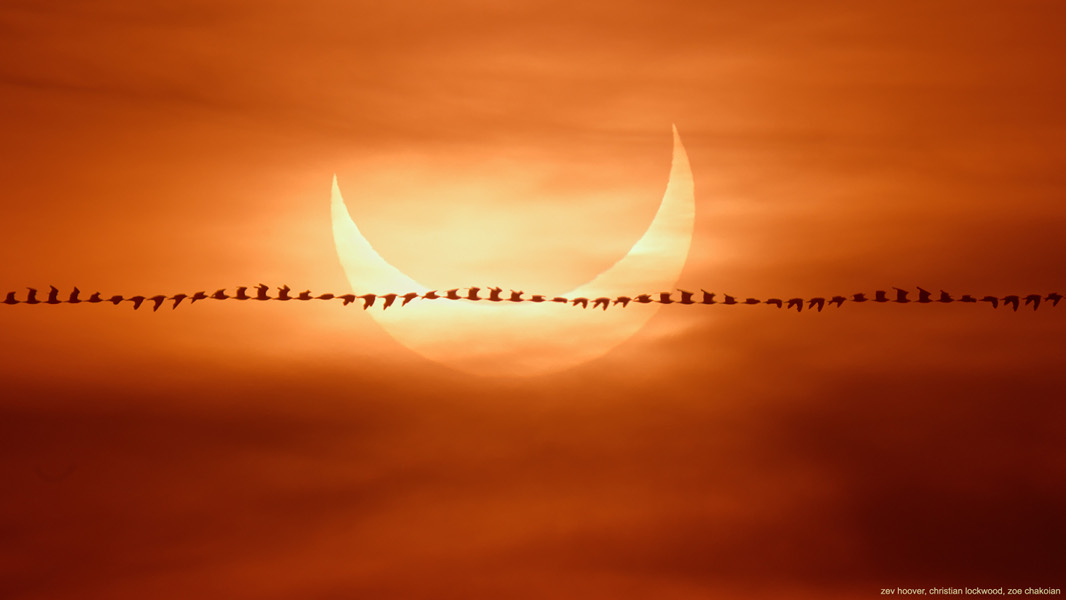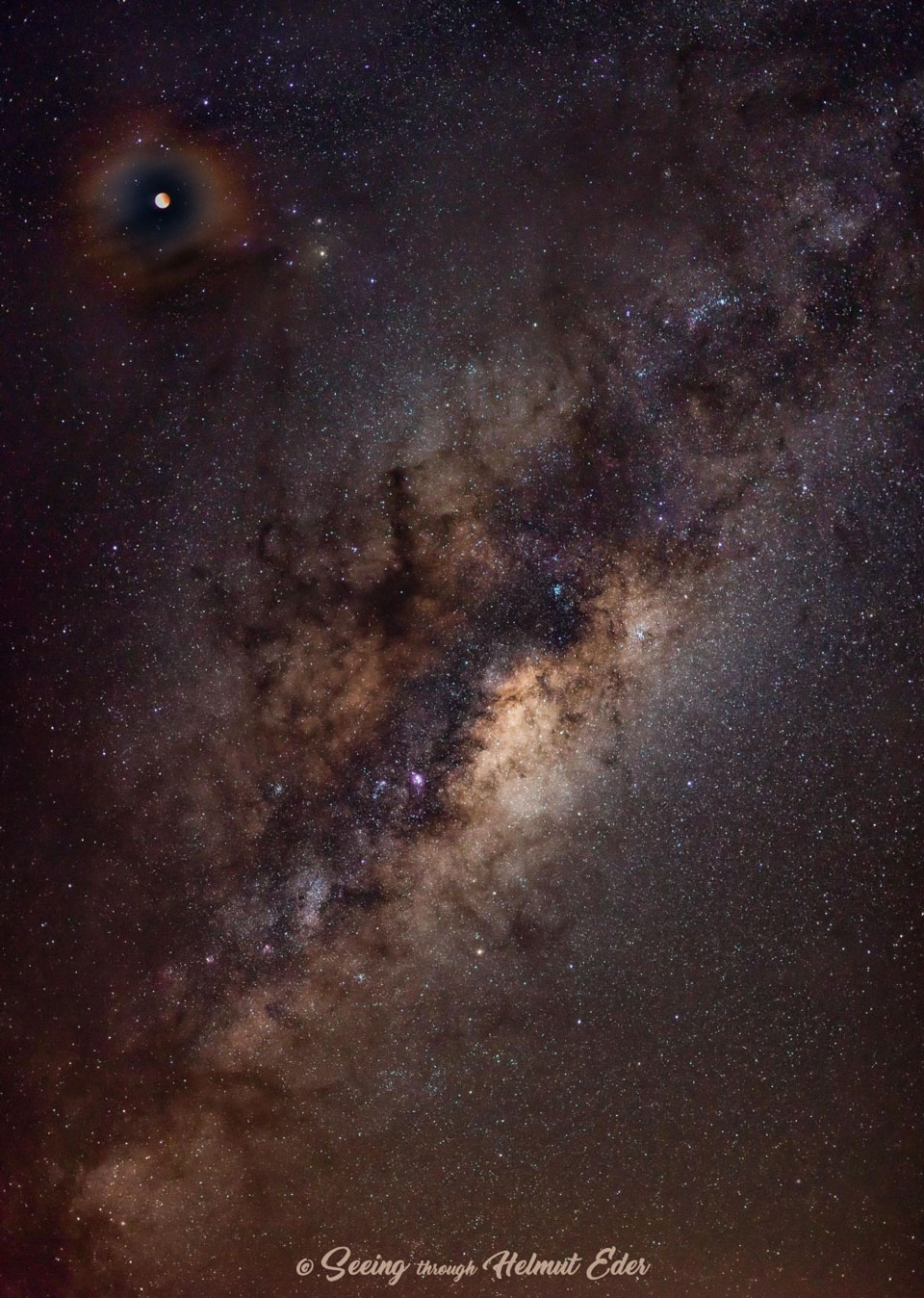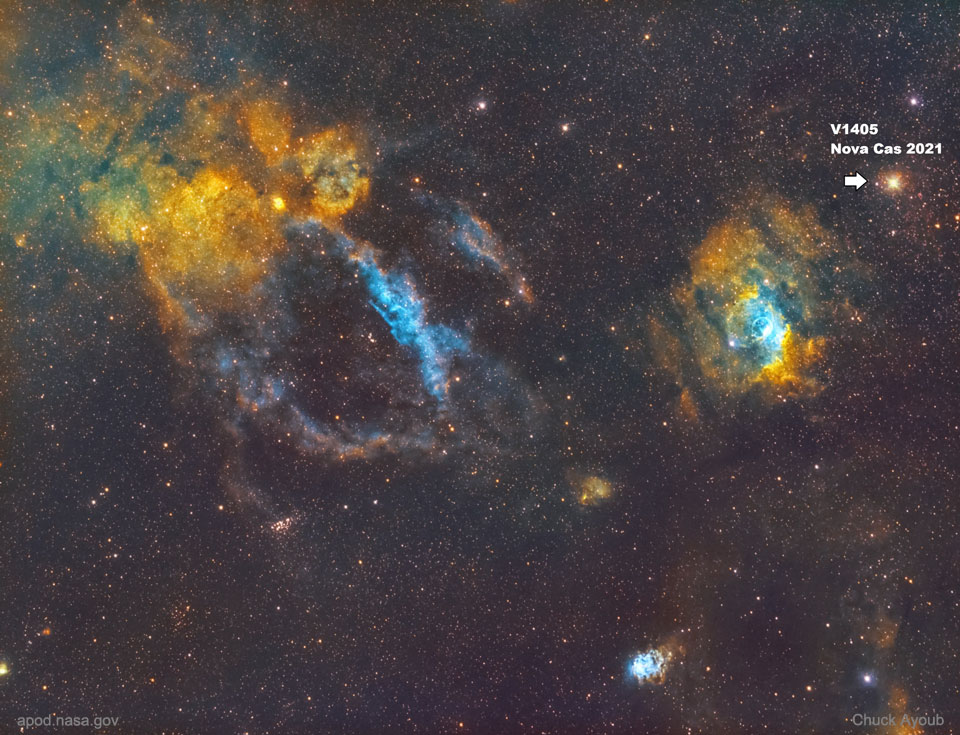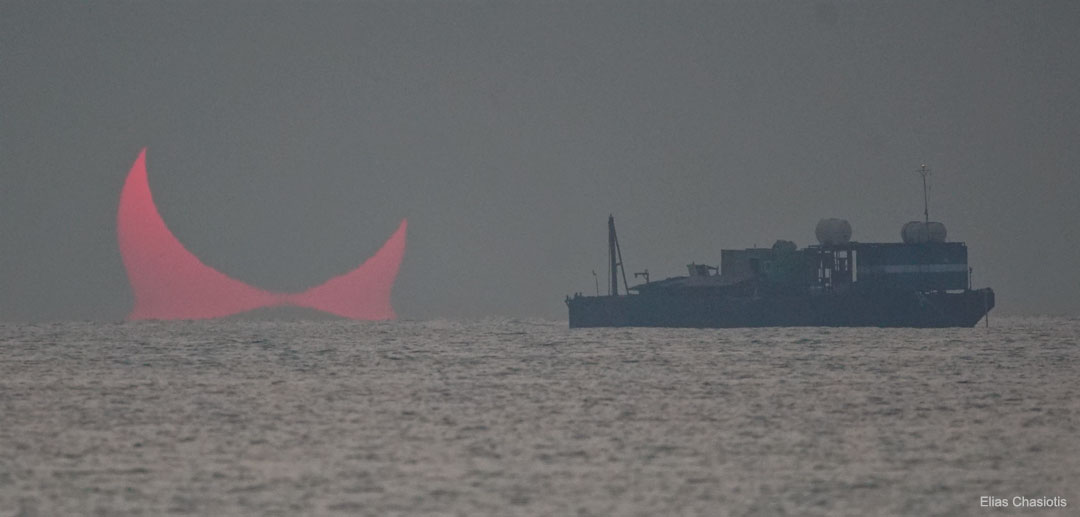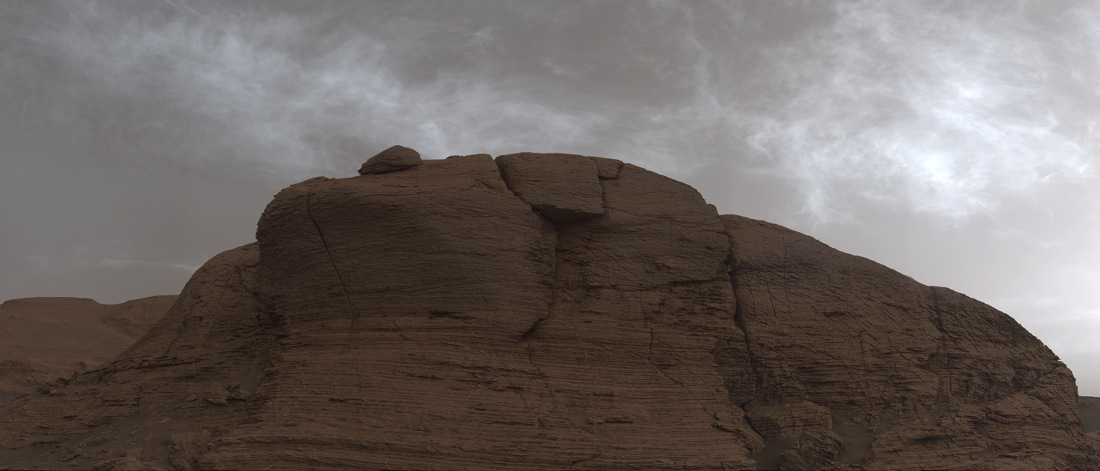Nombre total de pages vues
14/06/2021
11/06/2021
ASTRONOMY - Eclipse Flyby
2021 June 11
Image Credit & Copyright: Zev Hoover, Christian Lockwood, and Zoe Chakoian
Explanation: On June 10 a New Moon passed in front of the Sun. In silhouette only two days after reaching apogee, the most distant point in its elliptical orbit, the Moon's small apparent size helped create an annular solar eclipse. The brief but spectacular annular phase of the eclipse shows a bright solar disk as a ring of fire when viewed along its narrow, northerly shadow track across planet Earth. Cloudy early morning skies along the US east coast held gorgeous views of a partially eclipsed Sun though. Rising together Moon and Sun are captured in a sequence of consecutive frames near maximum eclipse in this digital composite, seen from Quincy Beach south of Boston, Massachusetts. The serendipitous sequence follows the undulating path of a bird in flight joining the Moon in silhouette with the rising Sun.
10/06/2021
I-PHONE ASTUCES - Comment améliorer la luminosité
ASTRONOMY - A Total Lunar Eclipse Corona
2021 June 9
Image Credit & Copyright: Helmut Eder
Explanation: This moon appears multiply strange. This moon was a full moon, specifically called a Flower Moon at this time of the year. But that didn't make it strange -- full moons occur once a month (moon-th). This moon was a supermoon, meaning that it reached its full phase near its closest approach to the Earth in its slightly elliptical orbit. Somewhat strange, a supermoon appears a bit larger and brighter than the average full moon -- and enables it to be called a Super Flower Moon. This moon was undergoing a total lunar eclipse. An eclipsed moon can look quite strange, being dark, unevenly lit, and, frequently, red -- sometimes called blood red. Therefore, this moon could be called a Super Flower Blood Moon. This moon was seen through thin clouds. These clouds created a faint corona around the moon, making it look not only strange, but colorful. This moon was imaged so deeply that the heart of the Milky Way galaxy, far in the background, was visible to its lower right. This moon, this shadow, this galaxy and these colors were all captured last month near Cassilis, NSW, Australia -- with a single shot. (Merged later with two lower shots that better capture the Milky Way.)
07/06/2021
ASTRONOMY - A Bright Nova in Cassiopeia
2021 June 7
Image Credit & Copyright: Chuck Ayoub
Explanation: What’s that new spot of light in Cassiopeia? A nova. Although novas occur frequently throughout the universe, this nova, known as Nova Cas 2021 or V1405 Cas, became so unusually bright in the skies of Earth last month that it was visible to the unaided eye. Nova Cas 2021 first brightened in mid-March but then, unexpectedly, became even brighter in mid-May and remained quite bright for about a week. The nova then faded back to early-May levels, but now is slightly brightening again and remains visible through binoculars. Identified by the arrow, the nova occurred toward the constellation of Cassiopeia, not far from the Bubble Nebula. A nova is typically caused by a thermonuclear explosion on the surface of a white dwarf star that is accreting matter from a binary-star companion -- although details of this outburst are currently unknown. Novas don't destroy the underlying star, and are sometimes seen to recur. The featured image was created from 14 hours of imaging from Detroit, Michigan, USA. Both professional and amateur astronomers will likely continue to monitor Nova Cas 2021 and hypothesize about details of its cause.
06/06/2021
ASTRONOMY - A Distorted Sunrise Eclipse
2021 June 6
Image Credit & Copyright: Elias Chasiotis
Explanation: Yes, but have you ever seen a sunrise like this? Here, after initial cloudiness, the Sun appeared to rise in two pieces and during partial eclipse, causing the photographer to describe it as the most stunning sunrise of his life. The dark circle near the top of the atmospherically-reddened Sun is the Moon -- but so is the dark peak just below it. This is because along the way, the Earth's atmosphere had an inversion layer of unusually warm air which acted like a gigantic lens and created a second image. For a normal sunrise or sunset, this rare phenomenon of atmospheric optics is known as the Etruscan vase effect. The featured picture was captured in December 2019 from Al Wakrah, Qatar. Some observers in a narrow band of Earth to the east were able to see a full annular solar eclipse -- where the Moon appears completely surrounded by the background Sun in a ring of fire. The next solar eclipse, also an annular eclipse for well-placed observers, will occur later this week on June 10.
05/06/2021
ASTRONOMY - The Shining Clouds of Mars
2021 June 5
Image Credit: NASA, JPL-Caltech, MSSS
Explanation: The weathered and layered face of Mount Mercou looms in the foreground of this mosaic from the Curiosity Mars rover's Mast Camera. Made up of 21 individual images the scene was recorded just after sunset on March 19, the 3,063rd martian day of Curiosity's on going exploration of the Red Planet. In the martian twilight high altitude clouds still shine above, reflecting the light from the Sun below the local horizon like the noctilucent clouds of planet Earth. Though water ice clouds drift through the thin martian atmosphere, these wispy clouds are also at extreme altitudes and could be composed of frozen carbon dioxide, crystals of dry ice. Curiosity's Mast Cam has also imaged iridescent or mother of pearl clouds adding subtle colors to the martian sky.
SANTé/MEDECINE - Tout savoir sur le coeur humain - 10 - Infarctus dans le ventricule gauche
Si une artère coronaire est obstruée, l' irrigation du myocarde en sang diminue localement. Les cellules musculaires manquent d'o...

-
2022 September 26 All the Water on Planet Earth Illustration Credit: Jack Cook, Adam Nieman, Woods Hole Oceanographic Institution ; Data ...
-
2025 May 11 The Surface of Venus from Venera 14 Image Credit: Soviet Planetary Exploration Program , Venera 14 ; Processing & Copyri...

